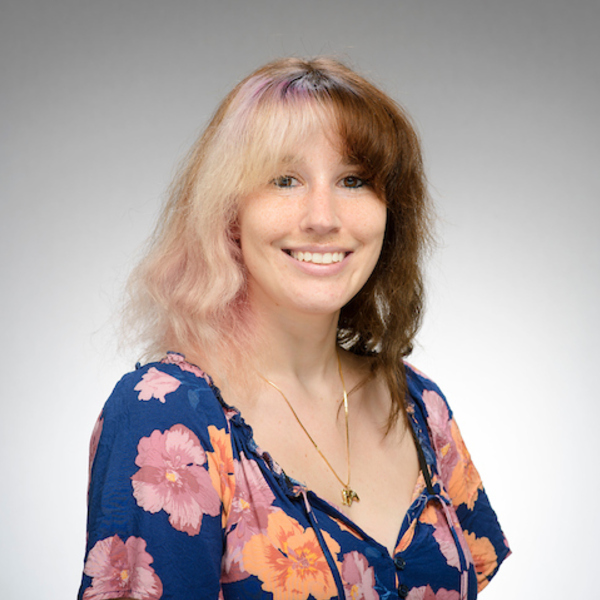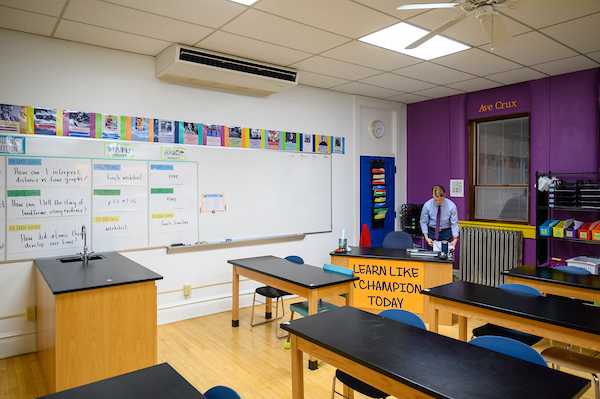Understanding the data within human connections is one of the things that the Center for Social Science Research (CSSR) at the Lucy Family Institute for Data & Society does best.
The CSSR partners with researchers in and outside of the University of Notre Dame to produce projects that transform data into visualized results that can address some of society’s most pressing challenges.
It was this kind of analysis that created an ongoing partnership between the CSSR and the Alliance for Catholic Education (ACE).

Jessica Young, data science consultant for the CSSR, has been developing a social network model that collects information and creates data visualizations of growing relationships between participants in ACE’s Ascent program. The Ascent program, which launched in 2021, recruits mathematics instructors within Catholic K-12 educational systems to participate in graduate credit-bearing coursework designed to encourage teacher leadership through interconnectivity.
All faculty and staff in each of the participant’s schools are asked to complete program surveys that are administered throughout the school year. Data collected from the surveys are then used to generate visualizations that represent individual connections within and across schools.
“When the initial surveys were conducted, the data indicated that teachers were experiencing knowledge silos,” says Young. “Between 2021-2023, further data was collected and analyzed, revealing a statistically significant increase in collaborations within and across schools. Through the scaled-up program, and as we obtain more data, we hope that the connections will start to bond together into a network.”
A shift to online learning is transforming how students and teachers interact with one another. Lesson plans can now be uploaded with a few clicks, exams can be generated to produce instant results, and messaging platforms enable contact with other instructors or students to be sent in seconds with limited personal communication. While efficient, some teachers are finding it increasingly difficult to build relationships with each other and with their students. This sense of disconnection is one reason that the annual teacher turnover rate among U.S. schools is high—more than 10% in some states—with many K-12 schools struggling to keep their doors open. Of the roughly 800 schools that closed their doors in 2022, 44 were Catholic schools.

“The stronger relationships you can build, the more impact you can have,” says Chrissy Trinter, acting director for the Institute for Educational Initiatives and associate professor of the practice for ACE who leads the Ascent program.
“The two-year program offers 18 graduate credits of coursework in leadership and mathematics through the lens of Catholic spirituality. As people of faith, the teacher-leaders who participate in the Ascent program can be instrumental in enacting change within the school systems by building connections with other educators,” Trinter says. “They have the power to deepen their relationships with others in their professional life, which then deepens their commitment to the work they are doing in their school.”
The data visualization network generated by Young provides insights into the interpersonal experiences of teachers as they change over time. “The model analyzes not just how often teachers talk to one another, but can also indicate who they are talking to, how often they are talking, and what they are talking about,” Young says.
Strengthening and sustaining the bonds between schools is central to the program’s goals for success. “Before the program, certain schools already had ties to other schools, but the social network model demonstrates that it is much more common for schools and instructors to be entirely insular,” Young adds.
Data will be collected and added to the Ascent social network model over the next four years to support five future Ascent cohorts. Analyzing the additional data will enable a better understanding of the relationship between the interconnectedness of individuals and their spiritual and mental well-being over time.
Trinter is convinced that University collaborations are contributing to Ascent’s success. “I really can’t express how instrumental the collaborations with the Lucy Family Institute, Notre Dame Learning’s Office of Digital Learning, the Wilson Sheehan Lab for Economic Opportunities and ND Creative have been in impacting Ascent’s mission to strengthen Catholic education.”
“The partnership between the Center for Social Science Research at the Lucy Family Institute for Data & Society and the Alliance for Catholic Education is producing data-driven roadmaps for Catholic schools to visualize their progress, and their path to success,” says Brian Fogarty, associate director of the CSSR. “For researchers in any discipline with an interest in using data visualization to enhance their research, I encourage you to contact the CSSR for support.”
To learn more about the CSSR, please visit the website, or contact Brian Fogarty, associate director of the CSSR.
Contact:
Christine Grashorn, Communications Specialist
Notre Dame Research / University of Notre Dame
cgrashor@nd.edu / 574.631.4856
research.nd.edu / @UNDResearch
About the Lucy Family Institute for Data & Society
Guided by Notre Dame’s Mission, the Lucy Family Institute adventurously collaborates on advancing data-driven convergence research, translational solutions, and education to ethically address society’s wicked problems. As an innovative nexus of academia, industry, and the public, the Institute also fosters data science access to strengthen diverse and inclusive capacity building within communities. Our vision is to become the preeminent intellectual beacon, inspiring collaborative, equitable, and impactful data innovations as a global force for good.